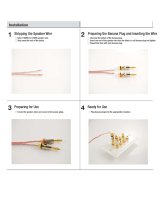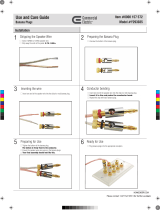
POLK AUDIO HISTORY—A PASSION FOR SOUND
Polk Audio was founded in Baltimore in 1972 by Johns Hopkins University graduates Matthew Polk and George Klopfer.
Today, Polk Audio is a leading international manufacturer of high quality home, car and multimedia loudspeakers. Polk
products emphasize superior sound and build quality, and feature many patented and award-winning innovations. Polk
Audio has built a reputation as “The Speaker Specialists.” Polk products are sold throughout the USA, Canada and in
over 50 countries around the world. Polk Audio’s mission has always been to build high quality, great sounding
speakers at affordable prices. For the people of Polk Audio, building speakers is not just a job; it’s a
passion.
PLACEMENT RECOMMENDA
TIONS
FOR THE CS
i SERIES CENTER CHANNEL LOUDSPEAKER
The CSi Series Center Channel Loudspeaker incorporates the most effective magnetic shielding available so it can be
placed safely on or near your TV or video monitor. If you notice video distortion or discoloration, immediately move the
speaker away from the TV and call Polk Audio Customer Service 800-377-7655 (9
AM to 6PM EST, US or Canada) or
[email protected]. The most popular placement for a center channel speaker is on top of your TV
, anchoring the
dialogue and effects to the screen
[figure 1]. An alternate placement is on a shelf below your TV [figure 1]. If you are
using a front projection TV system, place the center channel speaker on a small stand or table immediately below the
bottom of the projection screen, or at ear level behind the screen if your screen is acoustically transparent. Consult the
owner’s manual for your screen. Adhesive rubber feet are included with your CS
i Center Channel Loudspeaker and may
be attached to the bottom of the speaker to protect your furniture and keep the speaker in place.
PROCESSOR MODE CONFIGURATION
FOR THE CS
i SERIES CENTER CHANNEL LOUDSPEAKER
The “bass management” or “speaker configuration” menus of most surround receivers offer the choice of “normal” or
“wide” modes for center channel operation. In discrete channel digital processors these modes are referred to as
“small” and “large.” Normal (small) mode filters bass frequencies from the center channel speaker and sends them
instead to the front left & right main speakers or to the subwoofer output (LFE) jack. Wide (large) mode sends an
unfiltered, full range signal to the center channel speaker. Use the Small (normal) mode for optimum center (and
surround) channel performance and reliability.
CONNECTING YOUR CSi SERIES LOUDSPEAKER
[FIGURE 2]
W
e recommend 16-gauge or larger speaker wire. Follow the hookup directions included with your receiver. Strip 1/2 inch
(12.7mm) of insulation from each of the two conductors of the wire to expose the bare metal and twist each of the
individual conductors into single unfrayed strands. Note that one of the terminals on the rear of each speaker is red (+)
and the other is black (-). Make certain that you connect the wire from the red (+) terminal of your amplifier or receiver to
the red (+) terminal on your speaker and the wire from the black (-) terminal of your amplifier or receiver to the black (-)
terminal on your speaker. Most wire has some indicator (such as color-coding, ribbing or writing) on one of the two
conductors to help you maintain consistency.
To connect wire to the binding post
[figure 3], unscrew the hex nut and insert the bare wire into the hole near the base
of the binding post. Do not inser
t the insulated part of the wire into the hole as this will not give you a good connection.
Twist the hex nut back down the binding post until it firmly meets the wire. Do not over tighten.
To use Banana Plugs (US only): Unscrew the binding post lug nuts completely to expose the binding post plugs
(plastic plugs inserted into the binding posts). Carefully pry out the binding post plugs to expose banana plug holes.
Screw the lug nuts back on the binding posts and insert banana plugs. (This is for US owners only.)
Contact Polk Audio Customer Ser
SAFE LIMITS OF
OPERATION
Your Polk loudspeak-
ers are made with the
highest quality materi-
als for years of trou-
ble-free performance.
However, damage to
loudspeakers can
occur when an ampli-
fier, regardless of its
wattage, is made to
play at higher listening
levels than its power
can clearly produce
(usually beyond the “1
to 2 o’clock” position
on the volume con-
trol). This results in
very high levels of
audible distortion,
originating in the amp-
lifier
, that can add a
harsh, gritty sound to
music. Contrary to
popular belief, a
speaker is more likely
to be damaged by tr
y
-
ing to get too much
volume from a low-
power
ed amp or
receiver than from a
high powered one.
FIGURE 1
Most popular placement, above the TV screen. CSi Series Center Speakers are magnetically shielded for safe
placement near TV or video monitors. If you notice video distortion or discoloration, immediately move the
speakers away from the video source and call Polk Audio Customer Service 800.377.7655 (US and Canada)
La ubicación más común es encima de la pantalla del televisor. Los altavoces centrales de la serie
CSi tienen blindaje magnético para poder ubicarlos con seguridad cerca de monitores de televisión
o de video. Si nota que hay distorsión o descoloración de la imagen, aleje inmediatamente los
altavoces de la fuente de video y comuníquese con el servicio al cliente de Polk Audio.
Disposition la plus courante, au-dessus de l’écran. Les enceintes de la série CSi sont blindées
magnétiquement et peuvent être disposées à proximité d’une télé ou d’un moniteur vidéo.
Si vous percevez de la distorsion ou de la décoloration vidéo, éloignez immédiatement les
enceintes de l’écran et communiquez avec le ser
vice à la clientèle de Polk.
Häufigste Platzierung – über dem Fernsehbildschirm. CSi-Mittenlautsprecher sind für eine Platzierung in der Nähe
von Fer
nsehgeräten oder Videomonitoren magnetisch abgeschirmt. Wenn Sie eine Verzerrung oder Verfärbung des
Videobildes bemerken, sind die Lautsprecher umgehend von der Videoquelle zu entfernen. Setzen Sie sich in diesem
Fall mit dem Kundendienst von Polk Audio in Verbindung.
for mor
e infor
mation visit our website at www.polkaudio.com
OR
FIGURE 1
FIGURE 2
Basic Center Channel Speaker hookup diagram.
Set Center Channel to “small” in your receiver’s
Bass Management settings.
Diagrama básico de conexión.
Diagramme de branchement rudimentaire.
Gr
undlegendes Anschlussdiagramm.
FIGURE 2
FIGURE 3
Using binding post connections.
Uso de conexiones con tornillos de presión.
Utilisation des bornes de branchement.
Verwendung von Anschlussklemmen.
Loosen hex nut
Desenr
osque par
cialmente la
tuerca hexagonal
Desser
rer l’écrou
Sechskantmutter lösen
Insert speaker wire
thr
ough hole
Inser
te el alambr
e para
la bocina en el orificio
Insér
er le fil du haut-parleur
dans le trou
Lautsprecher-Draht durch
das Loch schieben
T
ighten hex nut
Enr
osque la tuer
ca de nuevo
Serrer l’écrou
Sechskantmutter festschrauben
Do not inser
t insulated
section of speaker wir
e
No inserte alambre con
material aislante
Ne pas insérer la partie
isolée du fil du haut-parleur
Isolation des Lautsprecher-
Drahtes nicht in das Loch schieben
FIGURE 3
To use Banana Plugs (US only):
Unscrew the binding post lug nuts completely
to expose the binding post plugs
(plastic plugs inserted into the binding posts).
Car
efully pr
y out the binding post plugs
to expose banana plug holes.
Screw the lug nuts back on the binding posts
and inser
t banana plugs.
(This is for US owners only
.)
FOR MANUAL UPDATES, VISIT
http://www.polkaudio.com/home/products/center/csi
FOR MORE DETAILED HOOK UP AND PLACEMENT INFORMATION, VISIT
http://www
.polkaudio.com/home/faqad/
FOR RECOMMENDED ACCESSORIES (INCLUDING SPEAKER STANDS, BRACKETS
AND EXCLUSIVE POLK AUDIO LOGOWEAR), VISIT OUR WEBSTORE:
http://shop.polkaudio.com/




